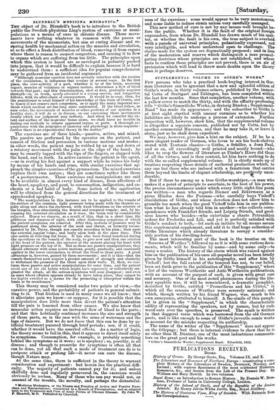SUPPLEMENTAL VOLUME TO GoTHR'S WORKS. * FEW persons who take a
practical book-buying, interest in Ger- man literature can be ignorant that a new and splendid edition of GOthe's works, in thirty volumes octavo, published by the immor- tal Cotta of Stuttgart and Tubingen, has been completed within the last few months. Since that completion another volume, with a yellow cover to match the thirty, and with the-affinity-professing title " Gethe's Semmtliche Werke, in dreissig Banden ; Supplement- Band " has made its appearance; and the subscriber to Gotha is at first sight startled with uneasy surmises as to whether his liabilities are likely to undergo a process of extension. Further inspection will, however, show him, that the supplemental volume is altogether a separate concern, published. not by Cotta, but by another commercial lifsecenas, and that he may take it, or leave it alone, just as he shall deem expedient. We may, however, give him a hint on the subject. If he be a mere elegant reader of German, who loves to see his book-shelves stored with Teutonic classics—a Clothe, a Schiller, a jean Paul, and so on, all exceedingly well printed and neatly bound—who likes to crop the flowers of literature as Pindar's Hiero did those of all the virtues and is then content, let him have nothing, to do with the so-called supplemental volume. It is chiefly Made up of treatises respecting those details of authorial production which, to any one but those who are imbued with a fanaticism that carries them beyond the limits of elegant scholarship, are poslvely unen- durable.
But if there be among us a true Giithe-worshiper,—a man who makes it a point of principle to ascertain, to the best of his power, the precise circumstances under which every little eight-line poem was written—a man who regards Riemer and Eckermann as a pions Hindoo does the Pnranas—who carefully buys Viehoff's elucidations of Gtithe, and whose devotion does not allow him to grumble too much when the good Triehoff tells him in one publica,6 tion what he has already told him in another—who collects corre- spondences with Frankfort friends, and Leipzig friends, and good- ness knows who besides—who entertains a chaste Petrarohian ardour for Frederike and Liii, and yet is perfectly satisfied with GOthe's conduct to both,—let such an initiate by all means secure this supplemental supplement, and add it to that huge collection of Giithe literature which already threatens to occupy a consider- able portion of his dwelling-house.
The most interesting part of the book is the treatise on the "Sorrows of Werther "; followed up as it is with some curious docu- ments, which will be familiar by name—and by name only—to many a reader. The history of the storm which was raised against him on the publication of his once all-popular novel has been briefly given by Gotha himself in his autobiography, and after him by Viehoff ; but the full extent of the tempest has not, to our belief, been set forth prior to the publication of this "Supplement," where a list of the various Wertherite and Anti.Wertherite publications, with an account of the purport of each, is given with great care and accuracy. One of the most noted phtenomena during the lite- rary squabble was, it will be remembered, a dramatic pamphlet, described by Gothe, entitled "Prometheus and his Critics," in which all the censors of Werther were severely satirized; and which, though written by his friend Wagner, was, much to his own annoyance, attributed to himself. A fae-simile of this pamph- let is given in the "Supplement," in which the characteristic oddity of representing the speakers, not by names but by rude wood-outs over the speeches, is preserved. The squib is written in that doggerel verse which was borrowed from the old German poets, and is like enough to some of Gtithe's juvenile comic works to account for the mistake respecting its authorship. The name of the writer of the " Supplement " does not appear on the titlepage ; but there is internal evidence to show that he is no other than H. Diintzer, one of the most industrious commenta- tors on the great poet and his works.
*G5the's Sinamtliche Werke; Supplement Band. Elberfeld, 1852.


























 Previous page
Previous page